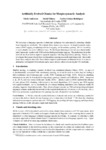Artificially Evolved Chunks for Morphosyntactic Analysis

Use este enlace para citar
http://hdl.handle.net/2183/36665Colecciones
- Investigación (FFIL) [877]
Metadatos
Mostrar el registro completo del ítemTítulo
Artificially Evolved Chunks for Morphosyntactic AnalysisFecha
2019-08Cita bibliográfica
Mark Anderson, David Vilares, and Carlos Gómez-Rodríguez. 2019. Artificially Evolved Chunks for Morphosyntactic Analysis. In Proceedings of the 18th International Workshop on Treebanks and Linguistic Theories (TLT, SyntaxFest 2019), pages 133–143, Paris, France. Association for Computational Linguistics.
Resumen
[Absctract]: We introduce a language-agnostic evolutionary technique for automatically extracting chunks
from dependency treebanks. We evaluate these chunks on a number of morphosyntactic tasks,
namely POS tagging, morphological feature tagging, and dependency parsing. We test the utility
of these chunks in a host of different ways. We first learn chunking as one task in a shared multitask framework together with POS and morphological feature tagging. The predictions from this
network are then used as input to augment sequence-labelling dependency parsing. Finally, we
investigate the impact chunks have on dependency parsing in a multi-task framework. Our results
from these analyses show that these chunks improve performance at different levels of syntactic
abstraction on English UD treebanks and a small, diverse subset of non-English UD treebanks.
Palabras clave
Morphosyntactic analysis
Evolutionary algorithms
Dependency parsing
Multi-task learning
Evolutionary algorithms
Dependency parsing
Multi-task learning
Descripción
It was held on the last week of August (Aug 26-30), in the center of Paris, in the "Grand amphitheatre du Monde anglophone" of the Sorbonne Nouvelle.
Versión del editor
Derechos
Atribución 3.0 España






